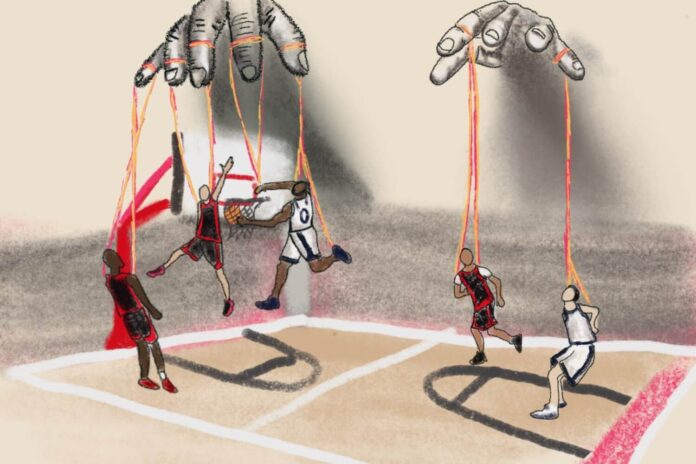There is no league in the realm of professional sports quite like the National Basketball Association (NBA). The league is a trailblazer in the realm of fan engagement. The NBA community may transcend the sport of basketball itself — the league happens to be home to one of the most profitable gambling markets in the world.
This past year saw the NBA partner with FanDuel, a company that then struck a deal with Amazon that made them the official “odds provider” for all NBA games streamed on Amazon’s Prime Video service. This agreement allows FanDuel to provide real-time odds updates, encouraging fans to try their luck in the world of sports betting as games progress.
This new precedent doesn’t just make accessing sports books more convenient for fans — it also solidifies gambling as an inalienable aspect of the NBA experience. With the basketball industry capitulating to one of the most controversial entities in all of sports, what better time could there be for a massive gambling controversy to make headlines?
To say the NBA is in trouble might be the understatement of the century. While scandals have pervaded the sports industry following the repeal of PASPA, a federal law that banned most states from legalizing and regulating sports betting, the scale of such misconduct has generally been limited to a few players at most. The past week has seen 34 individuals (and counting) arrested in conjunction with gambling suspicions — including two coaches.
FBI Director Kash Patel has referred to the purported fraud as “mind-boggling,” which might be the last words a league with a booming gambling industry wants to hear.
At the center of the controversy are two figures: Terry Rozier and Chauncey Billups. Rozier, a point guard who has accrued a decade of league service time, is under suspicion for manipulating his own performance in games in order to assist bettors. Billups, a member of the NBA Hall of Fame, has been accused of participating in mafia-rigged poker games during his time as the head coach of the Portland Trail Blazers.
While both cases appear shocking in isolation, examining recent context may serve to lessen the surprise. Rozier’s predicament isn’t unique — former Toronto Raptors forward Jontay Porter was ousted by the league following an investigation into his own gambling connections in 2024.
Conversely, Billups’ plight has significantly less precedent — it marks the first gambling-related indictment of an NBA employee (not including players) since former referee Tim Donaghy was sentenced to over a year in prison for his own mafia associations.
While these incidents make for a great public spectacle, the NBA’s laissez-faire approach to gambling renders such controversy as not only feasible, but expected. Sporting organizations would be wise to consider this experience a cautionary tale for their own betting regulations — especially considering the effects that gambling culture has on fans.
As sports gambling scandals and gambling advertisements become incredibly pervasive, player safety has become a huge concern. Across each major sport, players have spoken out about threats made against them and their families by angry sports bettors.
Morally, it’s the product of an increasing detachment from athletes being seen as real people. Betting promotes the dehumanization of players as their value becomes reduced to the numbers they can produce in gambling apps. We all wish we could make the big leagues, but people fail to consider the outside pressures that disgruntled gamblers can mount. If the value of players can be determined by how much money they can make for sports gamblers, then it’s no wonder fans have become so fearless in their attacks. They attack players over social media, after the games and have stalked players in their private lives on account of “selling a parlay.”
Major League Baseball has had its share of issues with fans crossing a line. In May 2025, Lance McCullers and his family received death threats online after a bad start. A month later, it was discovered that the messages were sent by an intoxicated bettor. Red Sox reliever Liam Hendriks (a survivor of non-Hodgkin lymphoma) received threats on his life after a poor appearance versus the Mets. He was told he “should have died from cancer,” which Hendriks called “disgusting and vile.”
Whether gambling is involved or not, players have arrived at a breaking point. Many have abandoned social media completely, especially if they are frequently harassed. The parasocial connection has become too powerful, and like a group of petulant children, bettors deserve to lose privileges.
Teams have attempted to take action against these offenders, but efforts so far have been futile. Teams such as the Astros and Red Sox have provided extra security in the player family section of the stadium during games, while also establishing cyber divisions to identify and remove accounts. Offending accounts can, of course, be removed from social media platforms, but it’s just as easy for the person behind them to simply create more. Hendriks has advocated for more direct action, stating that “nothing ends up happening.”
Unfortunately, as long as fans are motivated by anger, lost bets and a lack of self control, it’s hard to envision a solution. It’s ridiculous the opinions that people have become comfortable with expressing online. Social change may have to come before anything else.
All hope may not be lost, however, because players do have a platform they can use to rebel. Recently, Celtics star forward Jaylen Brown said “Don’t bet on me” during pregame media availability. Brown expressed that he doesn’t pay attention to sports gambling or “any of that stuff,” which is his way of staying disconnected from the drama and ill-meaning fans. Isolation from social media and toxic fan input may be the only way for players to avoid mental torture.
One thing is for certain: as long as sports gambling advertisements continue to grow and scandals keep occurring, out of line fans will show no sign of stopping. If leagues continue to openly endorse sports gambling sites because of the insane profits generated, the downsides must be acknowledged all the same. If lost bets are the main motivator behind unruly fans, it’s hypocritical for the four major leagues to keep accepting piles of money from sports gambling companies when player safety is compromised.
Regulations and warnings need to flash across our screens just as frequently as the promises of immense wealth. Companies like FanDuel own both the broadcasting rights for many sports teams as well as the ability to run countless gambling ads. Broadcasting conglomerate Bally Sports has been taken over by FanDuel and has rebranded as “Fanduel Sports Network.” If monopolies like FanDuel are allowed to rise to power, we may truly be living in a Wild West of sports gambling. Someone’s bound to get hurt.
Contact Mac Ribner and Ben Petteruti at ribner@oxy.edu and petteruti@oxy.edu
![]()
































